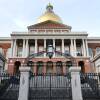Presidential candidates Mitt Romney and Rick Santorum are neck-and-neck in the polls in the run-up to the Michigan Republican primary on Tuesday.
One group that Romney appears to have an advantage with is Roman Catholic voters despite the fact that he is Mormon and Santorum Catholic.
The disconnect between faith and politics highlights differences among Catholics and shows that some religious voters are focusing more on other issues.
Declaring Faith
Santorum doesn't shy away from letting people know that he's a man of faith. He visited the Knights of Columbus hall in Lincoln Park on Friday. The Knights of Columbus is a fraternal service group, sort of like a Catholic version of groups like the Shriners. Santorum is a member, and his faith a central theme in his campaign.
"I'm a Catholic, and I'm told that one of the responsibilities of the Church is to care for those who are the least among us," he said, "and I believe that, and that's a real responsibility for all of us."
According to Public Policy Polling, Santorum's faith and image as a family man give him a boost in Michigan with Protestants, Evangelicals and those who consider themselves "very conservative." Some national polls differ, though.
Romney leads the field with moderates, "somewhat conservative" voters and Catholics, according to the Public Policy poll.
"There's a lot of complexity there," says John Green, a political science professor at the University of Akron. "Religion and politics often line up, but they don't always correlate perfectly."
The Catholic Spectrum
Green says you can think of Catholicism on a continuum.
"There is ... what we might call the orthodoxy of religious beliefs, and someone like Sen. Santorum is a very orthodox Catholic in terms of religion. He holds very closely to the traditional teachings of the Church," he says.
That continuum moves from the very traditional to the nontraditional.
"Some Catholic conservatives, or liberals for that matter, may be turned off by a fellow parishioner or a Catholic candidate who is self-consciously a traditionalist," he says.
Green says until the 1960s, regardless of where Catholics stood on that continuum, they tended to vote as a group for Democrats. But as Catholics — many of whom were recent immigrants — began to assimilate and become more accepted, their views on politics began to splinter. You can see that diversity of thought at almost any parish.
Religion Takes A Back Seat
Few things say "Midwestern Roman Catholic" like a Lenten Friday night fish fry. At St. William's Parish in Walled Lake, Mich., nearly 1,000 parishioners and their friends line up for fish fry, shrimp and cheese pizza.
"It's endless refills, so you can literally let the fat kid inside of you out and eat as much as you want," says Katie Goebel, whose father runs the fish fry.
She's not just here for the fish; she's also here to see Santorum. Goebel hasn't made up her mind who to vote for, but her faith plays a role.
"I will admit it does play a big role on issues like on contraception, abortion, things like that. But other things, like marriage and all that, I'm sort of up in the air," she says. "You know, people more [in] my generation, we're seeing things like gay marriage and stuff like that as OK."
Jan Artushin and her husband both attend mass regularly, and they're both undecided.
"I think we have to focus on the economy and jobs," she says. "I think that the religious issues ... [are] taking a back step because I think we're in such dire straights right now."
Copyright 2016 NPR. To see more, visit http://www.npr.org/.



